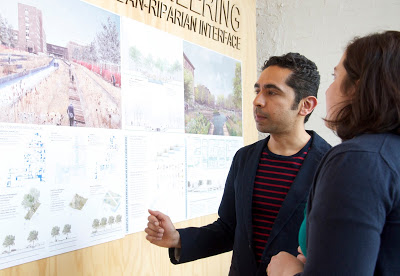
Last month, the U.S. EPA awarded University of Illinois at Chicago and University of Illinois at Urbana-Champaign first and second prizes in their Campus RainWorks Challenge. The national competition recognizes student-led green infrastructure plans and projects to manage stormwater on campus. Eliana Brown, has been following the UIUC plan from the beginning.
The first time I heard that landscapes could be designed to improve water quality, it was a revelation. I knew about the highly-effective bioremediation treatment cells at industrial facilities. But, the fact that the landscapes we walk through in our daily lives could have that power was exciting. What came to be known as “green infrastructure” is an elegant blend of landscape architecture and civil engineering that places of higher learning should embrace.
 Because I’m fond of the small creek running through the University of Illinois’ engineering college—known as Boneyard Creek—I have always wanted to see an entry from my campus. This year, I got my wish and then some. U.S. EPA announced on Earth Day that “Reverse Engineering: The Engineering Campus as Catalyst,” a master plan designed by a multi-disciplinary team of UIUC students under the direction of landscape architecture instructor Tawab Hlimi earned 2nd place. According to the EPA, 64 teams from 23 states submitted entries.
Because I’m fond of the small creek running through the University of Illinois’ engineering college—known as Boneyard Creek—I have always wanted to see an entry from my campus. This year, I got my wish and then some. U.S. EPA announced on Earth Day that “Reverse Engineering: The Engineering Campus as Catalyst,” a master plan designed by a multi-disciplinary team of UIUC students under the direction of landscape architecture instructor Tawab Hlimi earned 2nd place. According to the EPA, 64 teams from 23 states submitted entries.Building off this success, Hlimi and teaching assistant Faezeh Ashtiani showed the plan along with the work of their spring semester students in an exhibit called “Reverse Engineering: Reconfiguring the Urban-Riparian Interface” at [CO] [LAB] in downtown Urbana. Students expanded on the Campus RainWorks plan upstream and in other parts of campus, including three visions of Dorner Driver Retention Pond that add water quality filtration to the existing water storage function.

